Here’s Who Came Out for RFK Jr.’s Campaign Relaunch
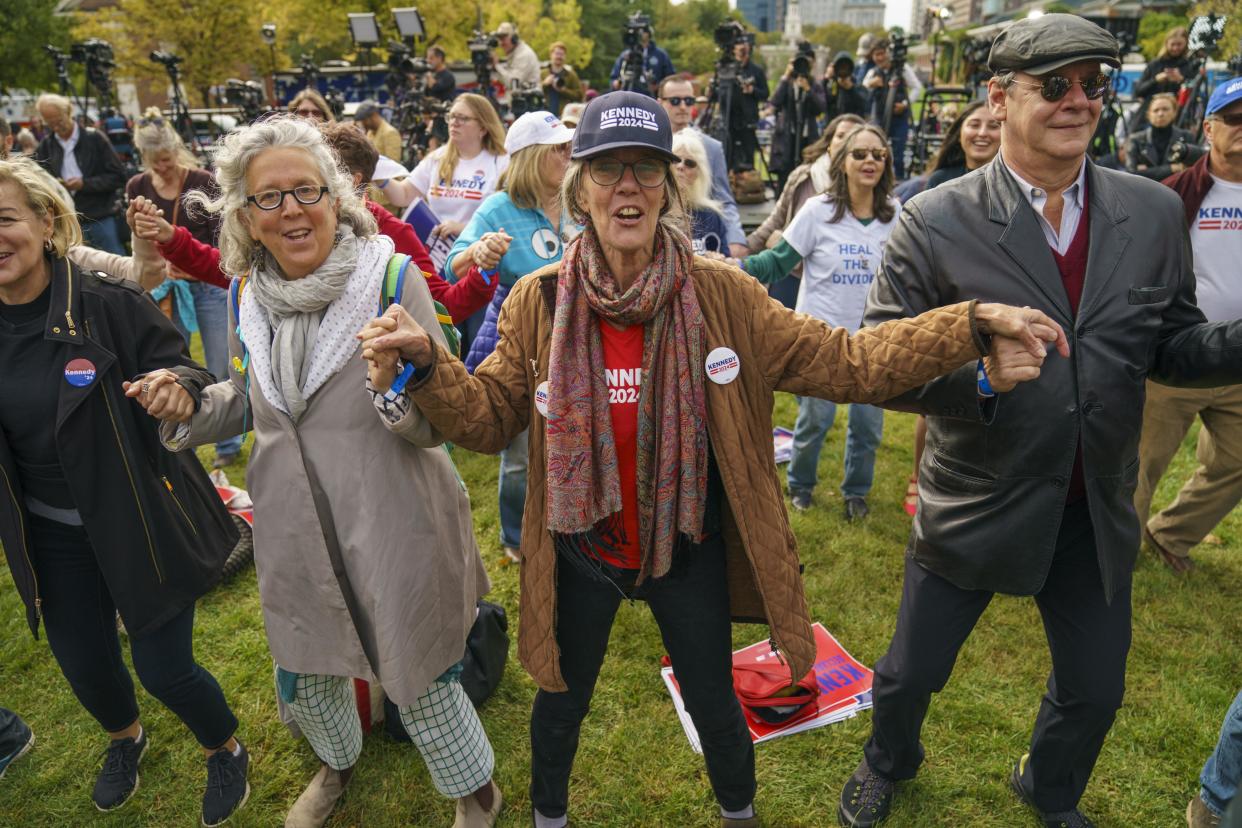
America is a weird country, and that was very clearly on display on Monday in Philadelphia. Speaking to a crowd of hundreds two blocks from Independence Hall, Robert F. Kennedy Jr. announced his independent bid for the presidency in front of what often felt like a convention of the political fringe. For Kennedy, the event functioned as a restart to a 2024 campaign that he originally launched as a Democrat in the spring, but that had failed to gain momentum among the party’s primary electorate.
Adherents to every niche point view showed up for the start of the political scion’s post-partisan crusade. Devotees of the personality cult of the late Lyndon LaRouche—a perennial presidential candidate who was convicted of mail fraud—went up to attendees and asked them if they were familiar with George Washington’s Farewell Address before trying to sell them on a fringe Senate candidate in New York. Falun Gong members were promoting their own social media website that promised a “nonaddictive algorithm.” The crowd included a QAnon celebrity and a Mike Flynn acolyte. The speakers included a Native American elder giving a land acknowledgment and former presidential hopeful Dennis Kucinich.
But, for such a varied crowd, the message delivered by Kennedy was rather banal. It was No Labels for the paranoid, a form of anti-politics that offered no platform save for hostility toward politics as usual. For Kennedy, the root of America’s problems is the “addiction to taking sides,” and he said that he had learned during his campaign to forswear that evil habit.
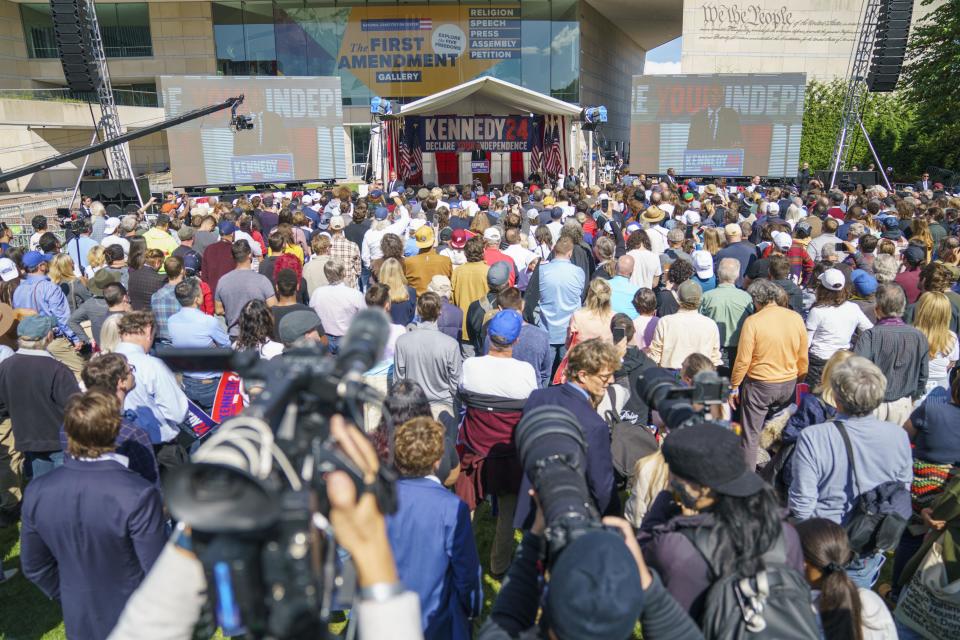
In fact, he dismissed political labels altogether. “These labels make less and less sense,” Kennedy said from the stage. “And out of habit, we still group ourselves around the empty husks of those old alignments and threadbare ideologies.”
Most of the key issues dominating American politics were irrelevant in his view. “I’m proud to say that my supporters include both pro-lifers and pro-choicers,” touted the presidential hopeful. “They include climate activists and climate skeptics. They include the vaccinated and unvaccinated.”
He said he could unite everyone against the common enemy of the “uniparty” and the lobbyists who secretly run it. He said he was not anointed by “shadowy institutions” or backed by the “cynical elites.” Instead, as he described himself, “I am merely the bowsprit of a ship that is going to cut through the armada of secrecy, corruption, and lies.”
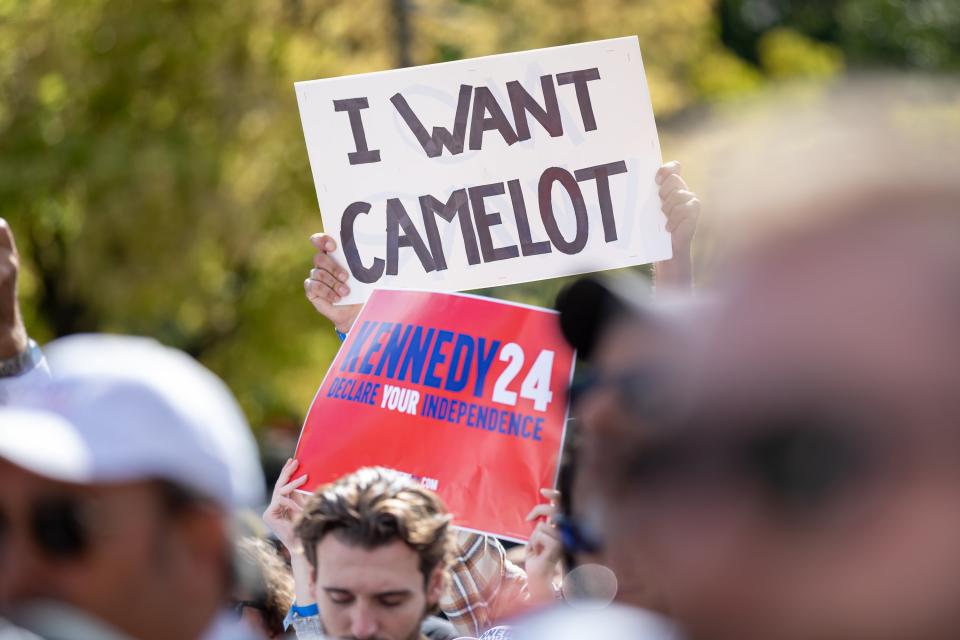
The insinuation of dark partisan forces is a Kennedy trademark at this point. The vocal vaccine opponent has long touted an array of dangerous conspiracy theories about public health that preceded the COVID pandemic. In 2019, Kennedy’s attempts to discredit vaccines helped to fuel a measles epidemic in Samoa. However, he gained new attention in the past few years by mounting a concerted campaign against COVID vaccines, and he infamously compared being unvaccinated in modern America to the plight of Anne Frank in Nazi-occupied Holland during World War II.* Kennedy has been repeatedly condemned by his family members (and others), starting long before he began to run for the presidency.
Attendees had seemingly traveled from all over the country for the event. A band from California provided the pre-rally entertainment, where much of the music was seemingly songs about either going to or leaving from Fresno, California. One speaker, clad in an American flag shirt and sparkly fanny pack, boasted of having driven his Kennedy bus up from Tampa, Florida, for the event. William Hassan of Warrenton, Virginia, said he had left with his friends at 4 that morning and caught a few hours of sleep in the car before the event. A Trump voter in 2016 who cast a ballot for the libertarian candidate in 2020, Hassan was attending his first political rally, he said, and cited Kennedy’s position on “freedom of health care and medical choice” as a reason for his support, along with his dismay with the two-party system.
Other attendees were just as underwhelmed with the current state of American politics. Bruce Bliven of Holyoke, Massachusetts, who had driven his father down in a car of Kennedy supporters, was so unimpressed with both Biden and Trump that he told Slate, “I couldn’t even tell you which one of the two of them would be the better choice.” In contrast, when asked what made Kennedy different from the past two presidents, Bliven said simply, “For me, it’s kind of shallow: He just hasn’t messed up yet.”
An air of paranoia undergirded the event. Kennedy, whose father and uncle were famously assassinated, has made his lack of Secret Service protection a key talking point through his campaign and has insisted that his requests for federal agents to protect him have been wrongfully denied. Perhaps as a result, the event was defined by remarkable displays of security theater: Concentric rows of bicycle racks were used to herd prospective attendees through three magnetometers. No one could bring any food or liquid inside the event—which was probably a blessing considering that there were no restrooms inside the security perimeter.
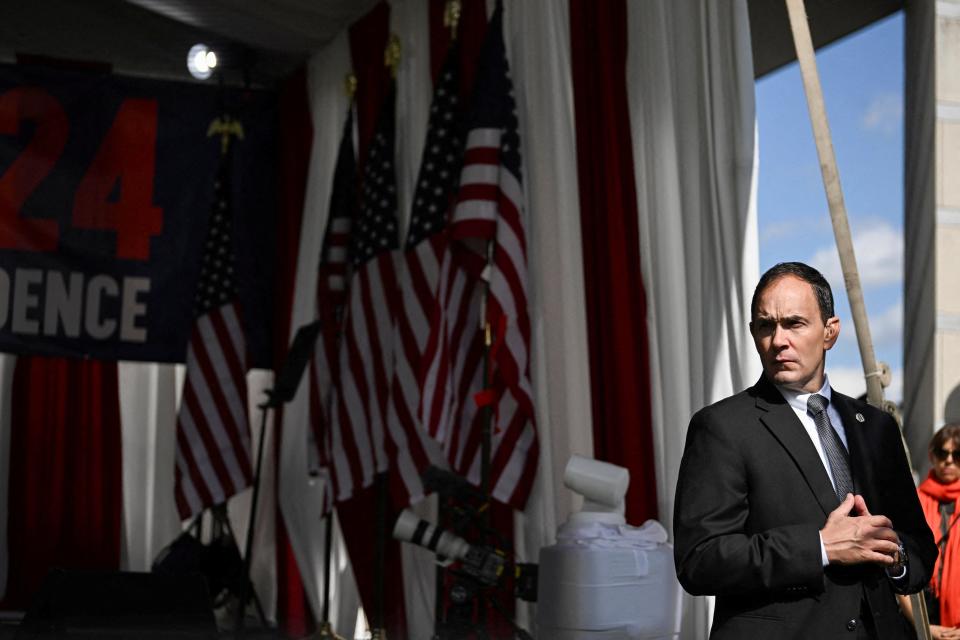
All throughout loomed alert-looking security officials dressed in black suits (needing only a fedora to audition for the Blues Brothers), and there was even a security guard with binoculars on the rooftop of the National Constitution Center above where Kennedy spoke. The candidate spoke from under a tent, and was rarely visible other than when he was speaking. Unlike most candidates who try to shake hands and greet supporters after a speech, Kennedy immediately disappeared from sight and was quickly hustled back inside the National Constitution Center. Instead of pressing the flesh to a triumphant walk-off song, Kucinich, who is Kennedy’s campaign manager, took the mic and told the crowd to use their phones to scan a QR code where they could make a donation.
After the event, outside a Kennedy campaign bus with a bumper sticker for the right-wing social conservative group Moms for America, volunteers were handing out free Kennedy yard signs stamped with a union bug to demonstrate it was made by a union shop. Standing a few yards away, a man with a Gadsden flag pin (“Dont Tread on Me”) was livestreaming the aftermath of the event as attendees browsed “Kennedy 2024” buttons for sale. They were emblazoned with messages like “Stop Ukraine Aid Disband NATO” and “Reunite America End The GOP/Dem Duopoly.”
Kennedy’s decision to run as an independent comes after his initial effort to run against Biden in Democratic primaries started tanking. Although he initially polled as high as 20 percent against the incumbent after his April announcement—probably because there was demand among Democrats for a 2024 candidate born after the end of World War II—that enthusiasm quickly faded away when primary voters realized that the alternative was an anti-Ukraine and anti-vaccine conspiracy theorist.
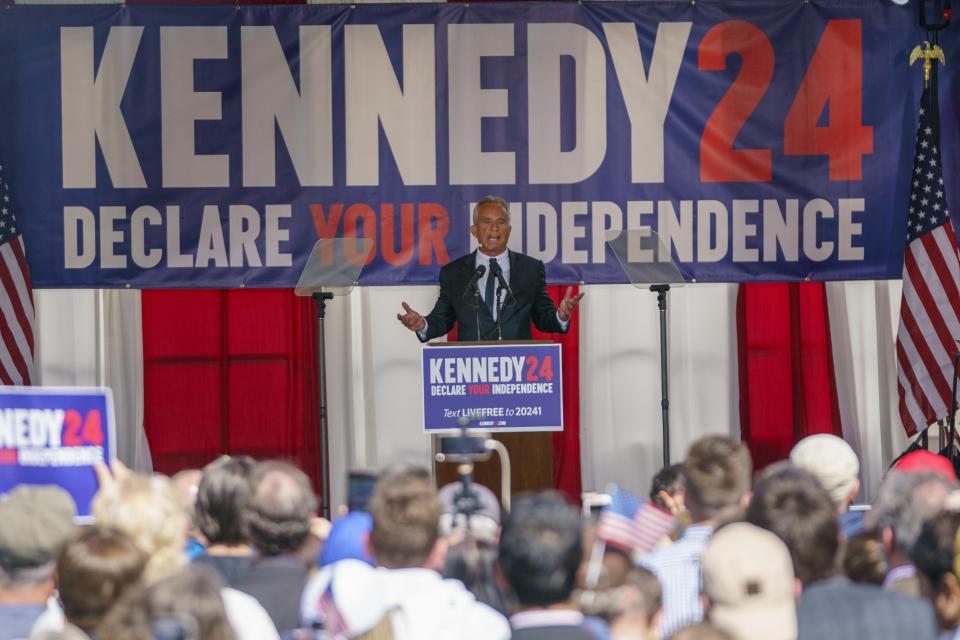
It didn’t help that Kennedy was not only drawing massive attention from right-wing media, appearing regularly on Fox News and other conservative outlets, but also was even hiring right-wing staffers. Among his campaign employees are a Republican state representative in New Hampshire and a longtime Republican operative in South Carolina.
The result was that Democrats increasingly soured on Kennedy, but Republicans grew to have a more favorable view of him. By July, only 28 percent of Democrats viewed Kennedy positively, but 55 percent of Republicans did, according to a poll from the New York Times and Siena College.
The question is what impact Kennedy can have on the race. Whereas once Democrats feared that the political dynast would be a spoiler for Biden, Republicans have since become increasingly anxious that a third-party candidate associated with opposition to the vaccines and the Ukraine war might actually hurt Trump. Throughout the morning and afternoon on Monday, Republican operatives sent out a barrage of press releases and tweets bashing Kennedy as a “radical Democrat,” citing his past support for Hillary Clinton and the Green New Deal.
However, in his speech, Kennedy insisted that he would be a spoiler for both candidates since, after all, he would win. And, he said, somewhat ominously, “I’ve seen the polls that they won’t show you.” (It was unclear who the “they” was.) His belief that he would hurt both parties might have been a dodge for most politicians, but it rang true here. After all, as he said in his speech: “I’ve surrendered my attachment to taking sides.”